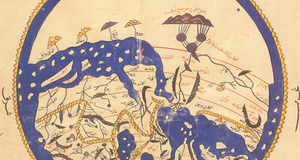America's Misguided 'War on Terror:' Contrasting Samuel Huntington's Clash of Civilizations with Ibn Khaldun's Theory of Social Solidarity
By
2013, Vol. 5 No. 09 | pg. 2/2 | « Ibn Khaldun and the Importance of ‘Asabiyya on the International ScaleIf the global war on terror has not achieved much success in twelve years, in what ways should we alter our policies? It is argued, based on Ibn Khaldun’s work, that recognition of the true constituent components of world order – states rather than civilizations – is vital in shifting our view toward more realistic causes of terrorism than those implied by Samuel Huntington. Ibn Khaldun, theorizing in the fourteenth century, believed human society is necessary for the survival of man, and once “spread over the face of the earth, there arises the need of a restraining force to keep men off each other in view of their animal propensities for … oppression of others” (Khaldun 1987 [1377]: 100). This restraining force is one man wielding authority – a sovereign. In other words, owing to the requirement of restraint, a polity arises out of the impossibility of a society existing without such a polity – and this polity, whether theocratic or kingly, is what is meant by a state (Khaldun 1987 [1377]: 102). At the core of this form of social organization lies ‘asabiyya, social solidarity. It works as a social cohesive in the first place through blood ties, but as he points out, “such relationships are more of an emotional than an objective fact … and when evident they act as a natural urge leading to solidarity” (Khaldun 1987 [1377]: 104). In other words, common language, culture and living conditions can also act as ties of kinship. ‘Asabiyya is most strongly present in tribal societies, where leaders cannot compel their men as they do not yet enjoy sovereign power. However, when sovereignty is (necessarily) established, the social cohesiveness gets lost: traditional ties of kinship weaken as the state urbanizes and modernizes. Moreover, each successive sovereign will attempt to weaken rivals in order to protect its authority, because in contrast to the principle of ‘leadership among equals’ found in tribal societies, sovereignty is “rule by compulsion” (Khaldun 1987 [1377]: 108-114). ‘Asabiyya, which is the basis of the state, is being destroyed – as a result, state power eventually declines until ‘fresh’ tribal societies manage to take over and start again. Based on Khaldun’s theory, roots of dissatisfaction across Arabic countries should be found in a loss of ‘asabiyya within those states. An important difference with Huntington’s theory becomes instantly apparent: according to Khaldun, major conflicts take place not between civilizations, but within civilizations organized in the form of a state. As conflicts are fought mainly between rulers and its population, good leadership is extremely important: in a state with a strong sense of social solidarity and belonging, a leader can expect to get political support. In Khaldunian theory, the leader is the embodiment of qualities that will “either propel his group to greater heights or lead him to undercut the solidarity of his own supporters as he seeks to assert his dominance” (Rosen 2005: 597). For the benefit of his state and for his own benefit, a good leader should therefore embody both political as well as moral authority. A recent example of how ‘bad leadership’, pursuit of a sovereign’s personal interests and neglect of the needs of the population lead to destruction of that aspect on which state support is built, is of course the Arab Spring. One might expect Muslim societies to have become more cohesive after independence from European colonial powers halfway through the twentieth century; yet it is then that the breakdown of ‘asabiyya seems to have started, and it has been the direct result of developments Khaldun warned for (Ahmed 2002: 30; Ahmed 2005: 595). Fast urbanization, unequal distributions of wealth and widespread corruption and mismanagement of rulers are some of the crucial factors that explain the decline of state solidarity in certain Arab states and that contributed to mass-mobilization for radical change.Based hereon, it is argued that Khaldun provides us with a model for good governance. This model is applied to the United States as a global hegemon, and argue that the way in which it has overtly and covertly ‘governed’ the Middle East is a more likely cause of terrorism than any inherent feature of Islam. It should first be noted, however, that Khaldun emphasized the importance of historical change: contextual interpretation is crucial, direct historical comparison useless. The presence of ‘asabiyya and the course of political events are ultimately not dependent on inevitable forces, but on specific circumstances (Rosen 2005: 597). This means that, contrary to how it may seem to some (see, for example, Ahmed 2005: 594), Khaldun’s theory does not render history predictable or cyclical. Indeed, he said: “When general conditions change it is as though creation changes from its very foundation and the whole world is turned around. It is like a new creation, … a newly made world” (Khaldun 1987 [1377]: 181). Following his logic, discussions on the constituent components of world order must also assess how the relations between these components have changed. The twentieth century saw the creation of a ‘newly made world’, one that could not have been foreseen by Khaldun: states have become increasingly interdependent economically and politically, while cultural ideas can be communicated across the globe instantly due to technological innovations. But this process has been highly asymmetrical: new ideas, both tempting and threatening, challenged traditional customs everywhere but in the West. The U.S. became the self-proclaimed hegemon, and the concept of ‘world leadership’ has increasingly become a guiding principle for its foreign policy. With Khaldun in mind, the U.S. should lead with political and moral authority to create the social cohesion necessary for support of its authority. However, the nation’s foreign policy in the Middle East has been characterized by partisan support for Israeli mistreatment of Palestinians, support of dictatorial regimes through trade relations, severe involvement in countries’ internal affairs (arguably for its own benefits) and bloody military operations. Although the States were dealing with dozens of distinct Muslim states, they consistently viewed them as one homogenous bloc and rarely entered into dialogue. If there seems to be a civilization of Islamic Arabs today, it is only because they have consistently been treated as such by the West. The clash of civilizations theory and the policies built on its premises are in effect a self-fulfilling prophecy. It is no wonder, then, that individuals believing their grievances could not be settled non-violently appeared throughout the entire Arab world. In the words of Reese, “our problem in the Middle East … is not the conditions in the Arab world. It’s our own policy, stupid” (2004, cited by Hossein-zadeh 2006: 121). It is not denied that international conflict may spring from differences in values and beliefs, which are central to a group’s identities and often have cultural roots. In fact, one of Huntington’s claims that might be accepted is that identity in global politics matters (Welch 2007: 214). Yet regionally shared cultural roots do not make that region into a homogenous civilization. The fact that 55 Muslim countries share Islamic roots means that their beliefs may be similar, but they all have different leaders and circumstances. As has been illustrated, Khaldun’s concept of ‘asabiyya essentially refers to the influence of leaders in their specific historical and political context (Lacoste 1984, cited in Rosen 2005: 597), thus one Muslim state will be different from the next. ConclusionThis paper discussed the phenomenon of terrorism and the way in which it has been combated by the West. It was argued that the clash of civilizations thesis, in singling out Islam and implying the nature of the religion makes conflict with the West inevitable, led to a miscalculated and ineffective response to terrorist attacks by the U.S. government. Based on Khaldun, it is arguedd that states are the constituent components of world order. Conflict takes place predominantly within states in response to bad leadership; however, the context of the present day and America’s unique position as world leader mean that the U.S. must maintain solidarity not only within its own population, but on the international scale as well. Failure to find any solidarity with the Middle East has led to a breakdown of authority and is at least one of the root causes of terrorism. Continuing to view the Middle East as a single homogenous civilization will likely perpetuate a self-fulfilling prophecy continuing to aggravate existing grievances. ReferencesAhmed, A. (2002) ‘Ibn Khaldun’s understanding of civilizations and the dilemmas of Islam and the West today’, Middle East Journal, Vol. 56, No. 1, pp. 20-45 Coll, S. (2012) ‘Days of Rage’, The New Yorker, 1 October. [Online] Available at: http://www.newyorker.com/talk/comment/2012/10/01/121001taco_talk_coll (accessed 7 January 2013) Hossein-zadeh, I. (2006) The political economy of U.S. militarism. New York: Palgrave Macmillan Huntington, S. P. (1993) ‘The Clash of civilizations?’ in The Council on Foreign Relations, ed. 1996, Samuel P. Huntington’s the clash of civilizations: the debate, New York: Council on Foreign Relations, pp. 1-26 Khaldun, I. (1987) [1377] ‘Prolegomena’ in Issawi, C., ed. 1987, An Arab philosophy of history: selections from the Prolegomena of Ibn Khaldun of Tunis (1332-1406), Princeton: The Darwin Press Piel, G. (1993) ‘The West is the Best’ in The Council on Foreign Relations, ed. 1996, Samuel P. Huntington’s the clash of civilizations: the debate, New York: Council on Foreign Relations, p. 55 Rosen, L. (2005) ‘Theorizing from within: Ibn Khaldun and his political culture’, Contemporary sociology, Vol. 34, No. 6, pp. 596-599 Snider, B. (2004) ‘Manufacturing terrorism’, antiwar.com, 14 June. [Online] Available at: http://antiwar.com/blog/2004/06/14/manufacturing-terrorism/ (accessed 6 January 2013) START (National Consortium for the Study of Terrorism and Responses to Terrorism). (2012). Incidents over time. Maryland: Global Terrorism Database. [Data file] Available at http://www.start.umd.edu/gtd/search/Results.aspx?region= (accessed 7 January 2013) Welch, D. A. (1997) ‘The clash of civilizations thesis as an argument and as a phenomenon’, Security studies, Vol. 6, No. 4, pp. 197-216 Suggested Reading from Inquiries Journal
Inquiries Journal provides undergraduate and graduate students around the world a platform for the wide dissemination of academic work over a range of core disciplines. Representing the work of students from hundreds of institutions around the globe, Inquiries Journal's large database of academic articles is completely free. Learn more | Blog | Submit Latest in Political Science |














